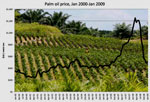
Soy cultivation in the state of Mato Grosso, Brazil. Photo by Rhett A. Butler 2009.
Palm oil produced from plantations grown in the Amazon is a better option than soy for meeting Brazil’s biofuel target, reports an assessment published in PNAS.
Oil palm yields substantially more vegetable oil per acre than other oilseeds, making it attractive as a feedstock for biodiesel production to meet Brazil’s fuel mandate for 2020. The researchers, led by David M. Lapola of the University of Kassel (Germany), found that utilizing palm oil as a feedstock rather than soy would result in less deforestation and lower emissions.
“[We] tested different crops that could serve as feedstock to fulfill Brazil’s biodiesel demand and found that oil palm would cause the least land-use changes and associated carbon debt,” they write.
“Because of its high oil yield, oil palm would need only 4,200 sq km to fulfill the 2020 demand for biodiesel in Brazil. In comparison, 108,100 sq km would be needed for soybean.”
While oil palm cultivation will result in lower deforestation than other crops, the research indicates Brazil’s biofuel mandate will nonetheless likely be a significant driver of forest loss in the coming decade.





Amazon rainforest will bear cost of biofuel policies in Brazil
(02/08/2010) Business-as-usual agricultural expansion to meet biofuel production targets for 2020 will take a heavy toll on Brazil’s Amazon rainforest in coming years, undermining the potential emissions savings of transitioning from fossil fuels to biofuels, warns a new paper published in the Proceedings of the National Academy of Sciences (PNAS). The research suggests that intensification of cattle ranching, combined with efforts to promote high-yielding oil crops like oil palm could lessen forecast greenhouse gas emissions from indirect land use in the region.
Will palm oil drive deforestation in the Amazon?

(03/23/2009) Already a significant driver of tropical forest conversion across southeast Asia, oil palm expansion could emerge as threat to the Amazon rainforest due to a proposed change in Brazil’s forest law, new infrastructure, and the influence of foreign companies in the region, according to researchers writing in the open-access journal Tropical Conservation Science. William F. Laurance, a senior scientist at the Smithsonian Tropical Research Institute (STRI) in Panama City, Panama, and Rhett A. Butler, founder of environmental science web site Mongabay.com, warn that oil palm expansion in the Brazilian Amazon is likely to occur at the expense of natural forest as a result of a proposed revision to the forest code which requires land owners to retain 80 percent forest on lands in the Amazon. The new law would allow up to 30 percent of this reserve to consist of oil palm.
Palm oil industry moves into the Amazon rainforest
(07/09/2008) Malaysia’s Land Development Authority FELDA has announced plans to immediately establish 100,000 hectares (250,000) of oil palm plantations in the Brazilian Amazon. The agency will partner with Braspalma, a local company, to form Felda Global Ventures Brazil Sdn Bhd. FELDA will have a 70 percent stake in the venture. The announcement had been expected. Last month Najib said Malaysia would seek to expand its booming palm oil industry overseas. The country is facing land constraints at home.